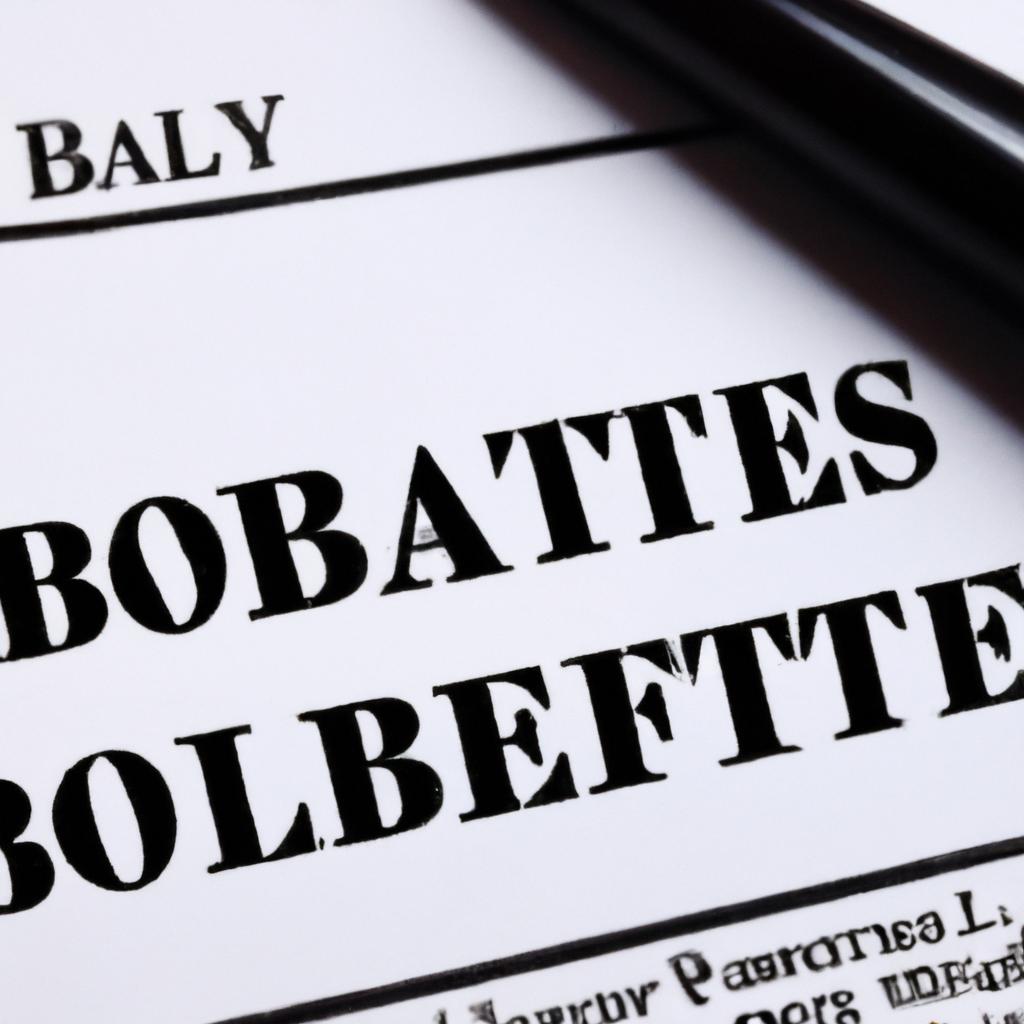When a loved one passes away, their will becomes a pivotal document in handling their affairs. However, many individuals are left wondering: do wills have to go to probate? In this article, we will delve into the complexities of probate and provide clarity on this often misunderstood process. As experienced attorneys at Morgan Legal Group in New York City, specializing in estate planning, probate, elder law, Wills, and trusts, we are well-equipped to guide you through the intricate world of probate law. Join us as we explore the ins and outs of probate and shed light on the necessity of probating a will.
Understanding the Probate Process for Wills in New York
In New York, wills typically have to go through the probate process after the individual has passed away. Probate is the legal process of proving a will in court and executing the deceased’s wishes. While some assets can bypass probate through mechanisms like joint tenancy, trusts, or beneficiary designations, many assets outlined in a will must go through probate.
During probate, the following steps are typically followed:
- Filing the will with the Surrogate’s Court
- Notification of heirs and beneficiaries
- Payment of debts and taxes
- Distribution of assets according to the terms of the will
| Asset Type | Probate? |
| Jointly owned property | No |
| Life insurance policies with named beneficiaries | No |
| Retirement accounts with named beneficiaries | No |

Benefits of Avoiding Probate for Your Will
****
When it comes to estate planning, avoiding probate for your will can provide numerous benefits for both you and your loved ones. By bypassing the probate process, you can save time and money, maintain privacy, and ensure a smoother transfer of assets to your beneficiaries. Additionally, avoiding probate can help prevent potential disputes and challenges to your will, ultimately providing peace of mind for you and your family.
One of the key advantages of avoiding probate is the ability to protect your assets from creditors and unnecessary taxes. By utilizing strategies such as setting up a living trust or naming beneficiaries on your accounts and property, you can ensure that your assets are distributed according to your wishes without the interference of the probate court. Ultimately, avoiding probate can streamline the estate settlement process and provide a more efficient and cost-effective way to transfer your assets to your heirs.

Factors to Consider When Deciding Whether Your Will Should Go Through Probate
When determining whether your will should go through probate, there are several factors that you must consider. Probate is the legal process through which a court validates a will and supervises the distribution of assets to beneficiaries. Here are some key factors to keep in mind:
- Complexity of Assets: If your estate is simple and consists of only a few assets, it may be possible to avoid probate altogether. However, if your estate is complex and includes multiple properties, investments, or business interests, probate may be necessary to ensure a smooth distribution.
- State Laws: Each state has its own probate laws and procedures. Some states have simplified probate processes for small estates, while others have more complicated probate requirements. It is essential to understand the laws in your state to determine whether probate is necessary.

Expert Legal Guidance on Navigating Probate for Wills in New York City
If you are wondering whether wills have to go through probate in New York City, the answer is usually yes. Probate is the legal process of validating a will and distributing the assets of the deceased according to their wishes. Here are some key points to consider:
1. Complexity of the estate: If the estate is simple and uncontested, probate can be a relatively straightforward process. However, if the estate is complex, with multiple assets, debts, and beneficiaries, probate proceedings may become more complicated.
Q&A
Q: Do wills have to go through probate in order to be executed?
A: Yes, in most cases, wills do need to go through the probate process in order for the deceased’s assets to be distributed according to their wishes.
Q: What is probate and why is it necessary?
A: Probate is the legal process of proving a will in court and administering the deceased person’s estate. It is necessary to ensure that the deceased person’s debts are paid off and their assets are distributed correctly.
Q: Are there any exceptions to the probate requirement?
A: There may be exceptions to probate depending on the size of the estate and the way the assets are held. Some states have simplified probate procedures for smaller estates or if the assets are held in a trust.
Q: How long does the probate process typically take?
A: The length of the probate process can vary depending on the complexity of the estate and whether there are any disputes among beneficiaries. It can take anywhere from a few months to several years to complete.
Q: Can probate be avoided altogether?
A: It may be possible to avoid probate through careful estate planning, such as setting up a living trust or joint ownership of assets with right of survivorship. However, it’s important to consult with an attorney to ensure that your wishes are properly carried out.
Closing Remarks
In conclusion, while the probate process may seem daunting, it is a necessary step to ensure that the wishes outlined in a will are carried out effectively. By understanding the complexities of probate and seeking professional guidance when needed, individuals can navigate this legal process with confidence and peace of mind. Remember, probate doesn’t have to be a scary or overwhelming process – it’s simply a way to uphold the intentions of a loved one and provide closure for all parties involved. So, rest assured that with proper planning and assistance, the probate process can be a manageable and meaningful part of honoring a loved one’s legacy.
 Do Wills Have to Go to Probate – Everything You Need to Know
Do Wills Have to Go to Probate – Everything You Need to Know
If you have ever dealt with the passing of a loved one, you may be familiar with the term ‘probate’. This legal process involves the validation and distribution of a person’s assets after their death. And while probate can be a tedious and time-consuming process, the question often arises – do wills have to go to probate?
The short answer is, it depends. In most cases, yes, wills do have to go through probate. However, there are some exceptions and ways to avoid the probate process altogether. In this article, we will delve into the details of probate, the role of a will in the process, and explore ways to minimize the probate process. So, let’s get started!
Understanding Probate
Before diving into whether wills have to go through probate, it’s important to have a basic understanding of what probate is. Probate is a legal process by which a court determines the validity of a will and oversees the distribution of a deceased person’s assets. This process also involves paying off any outstanding debts and taxes owed by the deceased person.
The main purpose of probate is to ensure that the deceased person’s wishes are carried out and that their assets are distributed fairly among their heirs. In most cases, probate is required by law and is a mandatory process for transferring ownership of assets from the deceased person to their beneficiaries.
Do Wills Have to Go Through Probate?
As mentioned earlier, in most cases, wills do have to go through probate. However, there are some scenarios where probate may not be necessary.
1. Small Estates
In some states, if the value of the deceased person’s assets is below a certain threshold, the probate process may be waived. The threshold amount varies from state to state, but it usually ranges from $10,000 to $50,000. In this case, the assets can be distributed to the beneficiaries through a simplified process, such as a small estate affidavit or summary probate.
2. Joint Ownership with Rights of Survivorship
If the deceased person owned property jointly with another person and there was a right of survivorship, the property automatically passes to the co-owner without going through probate. This commonly applies to joint bank accounts, real estate, or investment accounts.
3. Trusts
A trust is a legal arrangement where a trustee holds and manages assets on behalf of a beneficiary. If a person sets up a trust and transfers their assets to it before their death, the assets do not become part of their probate estate. This allows for a smoother and quicker transfer of assets to the beneficiaries without having to go through probate.
4. Payable-on-Death Accounts
Similar to a trust, a Payable-on-Death (POD) account also allows for the transfer of assets to beneficiaries without going through probate. This is because the account designates a beneficiary who receives the assets automatically upon the account owner’s death.
5. Transfer-on-Death Deeds
In some states, real estate can be transferred without probate by using a Transfer-on-Death (TOD) deed. This allows the property to be transferred to a designated beneficiary upon the owner’s death without going through probate.
Benefits and Practical Tips
Now that we have covered some scenarios where probate may not be necessary, let’s discuss the benefits and practical tips of avoiding probate.
1. Saves Time and Money
The probate process can be costly and time-consuming. It can take anywhere from a few months to a few years to complete, depending on the complexity of the estate. Avoiding probate can save the beneficiaries time and money and allow for a quicker transfer of assets. This can be especially helpful for families who are grieving and may not have the resources to go through a lengthy legal process.
2. Privacy
Probate is a public process, which means that anyone can access the documents and details of the deceased person’s estate. This lack of privacy can be a concern for some families. Avoiding probate can provide more privacy for the beneficiaries and protect them from potential scams or solicitations.
3. Greater Control
By avoiding probate, a person can have more control over how their assets are distributed and to whom. Probate can be unpredictable, and a judge may make decisions that are not in line with the deceased person’s wishes. By using a trust or other means to avoid probate, the person can ensure that their assets are distributed exactly as they intended.
In conclusion, while wills do have to go through probate in most cases, there are ways to avoid this potentially lengthy and costly process. The key is to plan ahead and consult with an attorney to determine the best course of action for your specific situation. By understanding probate and the various options available, you can make informed decisions to ensure your assets are distributed according to your wishes.

